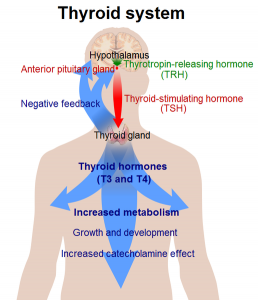Some experts estimate that there are about 59 million Americans who suffer from some kind of thyroid condition. This number includes those who have thyroid diseases like the Hashimoto’s disease, Grave’s disease, hypothyroidism, hyperthyroidism, thyroid cancer, thyroid nodules and more. And the most amazing thing is that this estimate includes a large proportion of people who never really get diagnosed properly for their thyroid condition. Some thyroid facts that can help you understand the importance of the gland and the manner in which you can manage and prevent problems involving it are mentioned below.
1. Thyroid development in the embryo – The thyroid gland appears in the fetus at about 3 to 4 weeks of gestation. This appears in the form of an epithelial proliferation at the base of the tongue. After about a couple of weeks the thyroid can be found at the base of the neck, as it should be. Between 18 to 20 weeks of gestation, the fetal hypothalamus and pituitary start secreting the TRH (thyrotropin-releasing hormone) and TSH hormones (thyroid-stimulating hormone). The amount of fetal triiodothyronine (T3) and thyroxine (T4) is self sufficient for the fetal brain development. Adequate levels prevent abnormalities that can otherwise be caused due to maternal hypothyroidism.
2. Hypothyroidism and hyperthyroidism – The most common and popularly known thyroid conditions are hypothyroidism and hyperthyroidism. Hypothyroidism is characterized by fatigue, weakness, aching muscles, poor appetite, weight gain, dry and rough skin, depression, memory loss and slow mental activity. On the other hand hyperthyroidism is known to manifest symptoms like nervousness and irritability, weight loss, increase in appetite, heat intolerance, palpitations and tachycardia, decreased menstrual flow in women and light sensitivity too.
3. Significance of iodine – Thyroid diseases are known to be far more abundant in countries where iodine is lacking in the diet. Iodine deficiency can cause enlarged thyroid glands as the gland strives to produce more thyroid hormones like thyroxine and triiodothyronine.
4. Diagnosis – The issue with most thyroid diseases is that they can go undetected for years. The symptoms of all the thyroid diseases can be associated with various other issues. They can also be mistaken for general lethargy or excitement, or normal weight loss or overeating. This is why it is smart to take a home thyroid test and see if there are any underlying thyroid problems.
5. Iodine can fight widespread thyroid conditions – Countries that have had an epidemic level of concern with regards to an underactive thyroid have resorted to iodized salt to eliminate endemic cretinism. Some governments have actually made it mandatory for all manufacturers to produce iodized salt only. The iodine is supplemented by adding sodium iodide or potassium iodide in the salt.
6. Excess iodine is also a concern – While increasing iodine levels has helped many countries, it has been brought to notice that excess of iodine intake can also cause autoimmune thyroid conditions.
Getting a regular check up done annually and keeping a watch on the typical symptoms of thyroid conditions is essential so that corrective measures can be taken as early as possible.
– Article by Anne Hamilton




